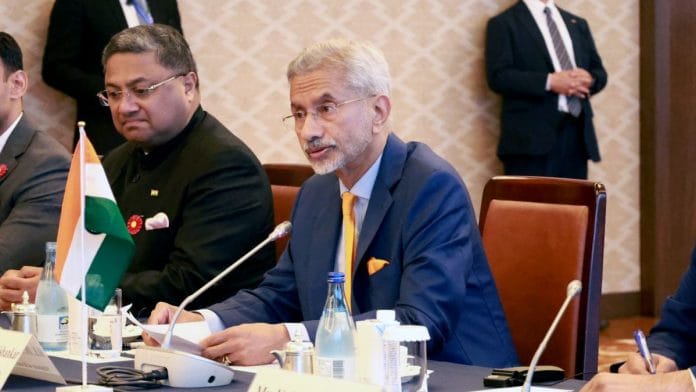New Delhi: Ahead of Prime Minister Narendra Modi’s trip to Ukraine, External Affairs Minister S. Jaishankar said that India believes a “decisive solution” cannot be found on the battlefield and that New Delhi, which was in touch “with both parties”, should be more active to move the two countries to the conference table for peace.
The foreign minister reiterated India’s position – that “a solution will not emerge from the battlefield” – adding that continuing warfare would not see any decisive outcome and that somehow peace negotiations must be opened up between the two countries.
“From the very start, and this feeling has grown in recent months, we believe there must be a return to dialogue and diplomacy,” said Jaishankar, during a press conference at the Japan National Press Club in Tokyo Monday.
Headded: “Our feeling today is that more needs to be done, that we should not resign ourselves to the continuation of the current state of conflict and say, ‘Let it take its own course’… Given the gravity of the situation, I think it is important for countries who are in touch with both parties… We should be more active there… We do believe today that it is important for everybody to do what they can to see if, in some way, something improves… some move out of the battlefield to the conference table takes place — and that is our endeavour.”
The external affairs minister’s comment comes as Prime Minister Narendra Modi is likely to visit Ukraine in the last week of August, as reported by ThePrint earlier. The prime minister’s first official overseas bilateral visit in his third term was to Moscow earlier this month, which received significant backlash from the US and its allies after Modi landed on a day a children’s hospital in Kyiv was attacked.
Ukraine blamed Russia for the attack, a charge denied by Moscow. The visit also coincided with the North Atlantic Treaty Organization (NATO) summit hosted by the US, which was held the same week, to celebrate 75 years since the founding of the military alliance.
After US Deputy Secretary of State Kurt Campbell took up the matter with then Indian Foreign Secretary Vinay Mohan Kwatra, American envoy Eric Garcetti warned New Delhi not to take the “relationship for granted”.
America’s top diplomat for the region, Donald Lu, has also informed the US House Foreign Affairs Committee that Washington D.C. was holding “tough talks” with India over the “timing and symbolism” of the visit.
Also read: Quad foreign ministers take aim at China, discuss Gaza & other global conflicts at Tokyo meet
Ties with China ‘not doing very well’
On the current status of ties between New Delhi and Beijing, Jaishankar was clear that these were currently “not doing very well”. The external affairs minister also said that New Delhi was not looking for help from third countries to solve current tensions.
“Right now I have to be honest… Our relations with China are not doing very well. The main reason for that was in 2020, during Covid, China brought very large forces to the border areas between India and China, in violation of agreements, and that created tensions and led to a clash… There were people who died on both sides and the consequences of that — since the issue has not been resolved fully — continue,” Jaishankar said.
The external affairs minister added that India has a “relationship with China” and if there was a problem or an issue, it would be best for the two countries to talk it over and find a way, rather than turning to other countries.
Jaishankar met with his Chinese counterpart Wang Yi twice in July, on the sidelines of the Shanghai Cooperation Organisation (SCO) summit in Kazakhstan and just a few days ago in Laos, on the sidelines of the ASEAN-mechanism meetings.
In both, the Indian external affairs minister reiterated the need to respect the Line of Actual Control (LAC) and past agreements and to approach the issues with a “sense of purpose and urgency”.
(Edited by Tikli Basu)
Also read: ‘Optics, ideology, economics’ — why China’s playing mediator, from Palestine to Ukraine






